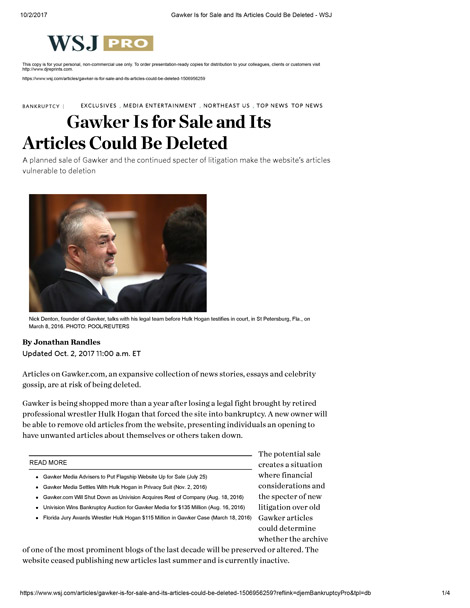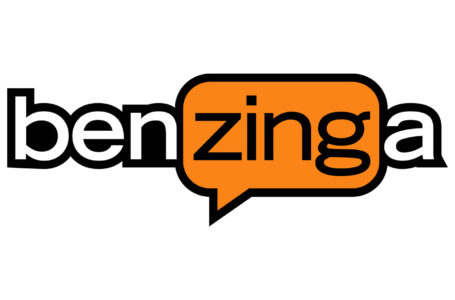A planned sale of Gawker and the continued specter of litigation make the website’s articles vulnerable to deletion
Articles on Gawker.com, an expansive collection of news stories, essays and celebrity gossip, are at risk of being deleted. Gawker is being shopped more than a year after losing a legal fight brought by retired professional wrestler Hulk Hogan that forced the site into bankruptcy. A new owner will be able to remove old articles from the website, presenting individuals an opening to have unwanted articles about themselves or others taken down.
The potential sale creates a situation where financial considerations and the specter of new litigation over old Gawker articles could determine whether the archive of one of the most prominent blogs of the last decade will be preserved or altered. The website ceased publishing new articles last summer and is currently inactive.
“The ‘Gawker’ brand is known for being a pioneer of internet journalism and playing a major role in influencing news organizations across the world to push the boundaries of traditional media,” according to a flier sent Friday to prospective buyers that was prepared by Dacarba LLC, the firm overseeing the sale process. Assets for sale include the Gawker domain, social media accounts and nearly 200,000 published articles. A copy of the flier was reviewed by The Wall Street Journal.
How much Gawker is worth in its current state is unknown but it could be valuable to individuals who want articles deleted or a publisher looking to fold a recognizable domain name into a portfolio of existing sites, according to people familiar with the situation. A former Gawker employee told the Journal he has also inquired about purchasing the site and is considering printing and collecting the articles in a volume to ensure the archive is preserved.
Univision Communications Inc. last year bought Gawker’s sister sites, among them Jezebel, Deadspin and Gizmodo, out of bankruptcy for $135 million. It passed, however, on purchasing Gawker. U.S. Bankruptcy Judge Stuart Bernstein has said advisers couldn’t sell Gawker at the time “because it was toxic.”
As it stands, the site is potentially more valuable to a person who wants articles removed than it is to a person who wants the archive preserved, a person familiar with the matter said, pointing to venture capitalist Peter Thiel who secretly financed Hogan’s case, the ruling on which drove it out of business. A new owner of Gawker could also face legal pressure to remove articles, people familiar with the matter said.
Charles J. Harder, the lawyer who represented Terry Bollea, Hogan’s real name, has filed two defamation lawsuits in recent months against Univision’s Gizmodo Media Group LLC and individual journalists. Gizmodo has said the lawsuits, which target articles on Jezebel and Deadspin, lack merit and are intended to intimidate journalists, which Mr. Harder has denied.
But the risk and potential cost of litigation could be reason enough for a new owner of Gawker.com to remove articles regardless of whether a lawsuit is viable, lawyers said. Judge Bernstein is weighing whether to dismiss the Deadspin lawsuit, the outcome of which could impact a potential sale of Gawker, people familiar with the matter said.
Mr. Harder sent multiple letters to Univision after the sale was announced but before the deal closed demanding removal of articles published by parent company Gawker Media LLC, including the Jezebel and Deadspin articles now subjects of the lawsuits. The letters were later filed as exhibits in bankruptcy court.
One letter demanded the removal of a 2016 Gawker article about President Donald Trump’s hair. Gawker Media has alleged the letters were part of a coordinated effort with Mr. Thiel to disrupt the Univision deal, which lawyers for Mr. Harder have denied.
“It would be the responsible thing to do for a new buyer to remove articles from Gawker.com that violate defamation laws, privacy laws or journalism ethics (Google “SPJ Code of Ethics”),” Mr. Harder said in an email to the Journal, referring to the
Society of Professional Journalists. “Such articles never should have been published in the first place, and if they were to be removed now, the public, and journalism, would benefit.”
Whoever purchases Gawker will be left to bear the cost of potential litigation. Gawker Media, which is liquidating, lacks the ability to provide meaningful indemnification for whoever acquires the website, said Will Holden, a managing director at Dacarba overseeing the sale and liquidation of Gawker Media. He acknowledged receiving multiple requests to remove articles on Gawker during the bankruptcy, including after the company’s liquidation plan took effect in March.
Mr. Holden said the criteria he will consider in evaluating offers will evolve as parties discuss their plans for Gawker; though the type and form of consideration will be a primary factor in selecting a buyer. He said so far he has received more than a dozen inquiries.
Mr. Bollea is entitled to 45% of the proceeds from a sale of Gawker, according to the $31 million settlement that ended the wrestler’s lawsuit. The settlement also bars the estate from selling Gawker to the site’s founder, Nick Denton, or other “insiders” of Gawker Media without Mr. Bollea’s consent.
A spokesman for Mr. Thiel didn’t respond to messages requesting comment. Mr. Thiel’s lawyer has pointed to the judgment to argue Mr. Bollea’s lawsuit was justified. At the National Press Club in Washington, D.C., last October, Mr. Thiel said Gawker was a “singularly sociopathic bully” that ruined people’s lives. Gawker published a story in 2007 that identified Mr. Thiel as gay, which he has said violated his privacy.
Bryan Freedman, an entertainment lawyer who has spoken to two potential buyers for Gawker, said he would generally advise any client to consider alternative revenue sources for the website. That includes how much money someone might pay to have articles taken down, though offering to remove articles for a price might be considered a form of extortion or face other legal problems that would make such a proposal unrealistic, he said.
A person who is the subject of multiple Gawker articles, who spoke to the Journal, said they contacted a lawyer after learning that the website was up for sale to see if it might present an opportunity to get articles taken down. A person familiar with the sale said removing articles would also likely attract public criticism.
Former Gawker writers told the Journal that the archive is an important record chronicling the misdeeds of powerful people. The archive is broad and includes everything from an early expose on the drug bazaar Silk Road, an article about
consuming TGI Fridays “endless” appetizers over 14 hours and several columns written from a dog’s perspective.
“I imagine most of the people who would be good stewards of the Gawker archives are too scared of being pursued legally to make that purchase,” said former Gawker writer Sam Biddle, now a reporter at The Intercept. “The threat isn’t just credible. It’s come to pass.”
A 2015 Gawker article Mr. Biddle wrote that referenced hacked emails from former Sony Pictures CEO Michael Lynton was deleted from the site without explanation during the bankruptcy proceedings. The emails, hacked by a group that calls itself Guardians of Peace, were made publicly available on the web.
“I recognize and appreciate that I am a public figure,” Mr. Lynton, now the chairman of Snap Inc., said in an email to the Journal. “I want to make clear that I did not play a role in having the Gawker article taken down.” Mr. Holden, the bankruptcy administrator, declined to discuss the article.
Gawker founding editor and media industry entrepreneur Elizabeth Spiers said she contacted Mr. Holden after speaking to former employees at the site to gather information about valuation. Ms. Spiers said the Gawker domain still has value but the question for a new owner is whether the site going forward can be extricated from Messrs. Thiel and Harder.
“A lot of people wanted to see how the Gawker vacuum would be filled when Gawker went away, but it really hasn’t been,” Ms. Spiers said.
As for the preservation of the archive, snapshots of Gawker articles have been captured by the Internet Archive, a nonprofit digital library, and similar websites. That alone, however, is far from a guarantee that these articles will continue to exist on the web, said Edward McCain, digital curator of journalism at the Donald W. Reynolds Journalism Institute at the University of Missouri. Articles preserved in this way can be difficult to find because they aren’t searchable on Google and require readers already know the URL.
What that means for Gawker as it awaits a new owner is that articles could be effectively lost if they are removed from the website. The site is being shopped now to continue winding down the bankruptcy and give a new owner time to implement a plan for Gawker before a restriction tied to the Univision sale on adding new content to the site expires in March, the administrator Mr. Holden said.
“Who is it that gets to decide what history gets erased?” says Mary-Rose Papandrea, a law professor at the University of North Carolina at Chapel Hill. “We don’t know what celebrity is going to be our next president or politician.”
Write to Jonathan Randles at Jonathan.Randles@wsj.com





